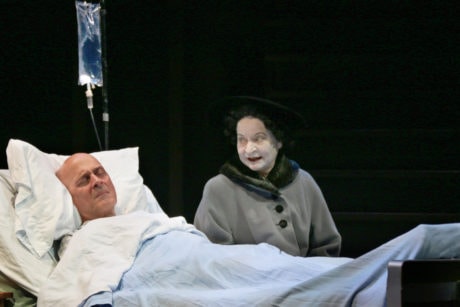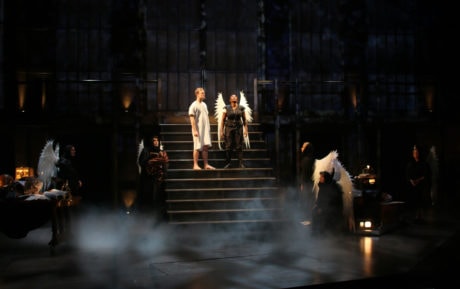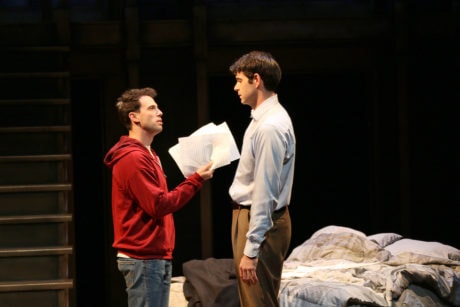Part II of Tony Kushner’s Angels in America opened last weekend at the Round House Theatre. A joint production with the Olney Theatre Center, the restaging of Kushner’s modern day epic has been long over due.

With superb acting, tight direction, and stellar scenography, Kushner’s mythopoetic lament to the passing of an era still strikes at the heart.
And it still leaves the mind wheeling in prophecy.
Angels in America: Part II: Perestroika ends on a cold day in 1990. Mikheil Gorbachev’s reformation of the Soviet Union is in full swing. The Cold War is ending. The American Left is in celebration.
I attended a conference in New York at that time at the New School for Social Research. The air was ecstatic with possibilities. With the Soviet bogyman toppled, the Left saw itself in the ascendency. Not only was peace in the Middle East but a breath away, but America herself was but an election away from a progressive landslide.
Sayonara Ronald Reagan!
From the Russian, perestroika means restructuring. Along with glasnost (openness), Soviet leader Mikheil Gorbachev hoped to make soviet-style socialism more responsive to the people’s needs.
In doing so, “the best laid plans” however, “go awry.” Boris Yeltsin replaced Gorbachev, the Soviet Union fragmented and collapsed, while the Russian mafia rose to prominence along with their friends, the oligarchs.
At the beginning of Perestroika, an old Bolshevik warns that the snake (the Soviet State) is not ready to shed its skin.
But prophets, even Russian ones, are rarely heeded by their people; that’s why they’re prophets, I suppose.

In America, the Angel‘s prophet, Prior (Tom Story), goes on a journey to heaven where he finds a band of disheartened angels (a. la. the archaic gods in Brecht’s Good Woman of Szechuan). God hasn’t so much died; he’s abandoned the world in disgust.
The gloom is palpable.
The prophecy is clear: the void is there to be filled.
Meanwhile, in today’s world, 26 years past the play’s opening, the Reagan Revolution has proven itself unstoppable. The rich are getting richer; the poor, poorer; and economic polarization is ripping the nation in two, albeit unequal, parts (or maybe it’s three: the 1%, the 9%, and the 90%).
To be sure, some gains have been made in the social sphere. Marriage equality and a rippling gender transformation are taking hold of our collective imaginations.
But the bread and butter issues, the heart of Reagan’s starve the beast approach to economic transformation, designed to destroy the New Deal and its big government mythology, seems on its way to victory.
Even Roy Cohn (Mitchel Hébert) is making a comeback of sorts, in the guise of his mentee Donald Trump.
Additionally, in recent years there have been murmurs about what an important role Joe McCarthy played in rooting communists out of the United States’ government.

In the midst of such idols and ghosts, all that’s left is the personal: Kushner seems to be saying.
So when Prior tells his ex-boyfriend, Louis (Jonathan Bock), that he shouldn’t come see him unless he’s got physical marks to reveal his anguish–that’s his mission.
When Louis does and Prior jokes that he shouldn’t have taken him so literally–that’s his mission.
When Harper (Kimberly Gilbert) drags her emptied soul from the Arctic air, now ready to fill it with whatever may come–that’s her mission.
When Joe (Thomas Keegan) pleads with Harper to please stay, that he will be nothing without her, but she doesn’t, leaving him empty–that’s his mission.
And so it seems that the ability for each man and each woman to lift him or herself from the rubble and stay true to whatever law has been etched into their flesh–that’s our mission.
Angels in America: Parts I & II reminds us that, when the world is in turmoil, all we have left is our ability to empathize.
And empathy begins with an acknowledgement that all of us suffer, all of us experience the anguish of loss and the pain of rejection. That alienation is not just for the marginalized.
The powerful may wield their swords and inflict their barbarism on the many but, without an acknowledgement of grief, their acts will be but the rant of tyrants.
Running Time: Three hours and 40 minutes, with two-ten-minute intermissions.
Round House Theatre and Olney Theatre Center’s Angels in America: Part II: Perestroka plays through October 30, 2016 at Round House Theatre -4545 East-West Highway, in Bethesda, MD. For tickets, call the box office at (240) 644-1100, or purchase them online.
Angels in America: Part 1: Millennium Approaches is presented in alternating repertory with Angels in America: Part Two: Perestroika.
LINKS:
Review: ‘Angels in America: Millennium Approaches’ at Round House Theatre and Olney Theatre Center by David Friscic.
Spine: Anguish, Angels, and the Reagan Revolution: ‘Angels in America’ at Round House Theatre by Robert Michael Oliver.
Post-Play Palaver: John Stoltenberg and Michael Poandl on ‘Angels in America: Millenium Approaches’ at Round House Theatre and Olney Theatre Center.





